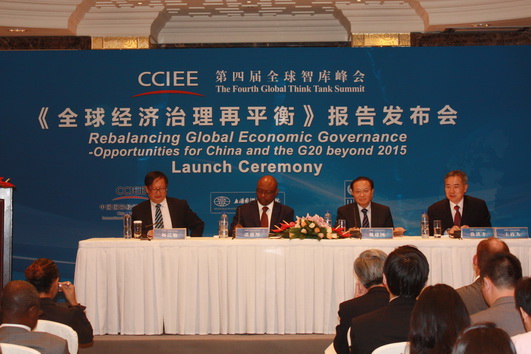Results of Rebalancing Global Economic Governance - Opportunities for China and the G20 beyond 2015 Published in Beijing
- Time:2015-06-26
- source:CCIEE
On June 26, Rebalancing Global Economic Governance - Opportunities for China and the G20 beyond 2015, a research report credited to CCIEE and UNDP, was jointly released at the 4th Global Think Tank Summit by Mr. Wei Jianguo, Vice Chair of CCIEE, Mr. Alain Noudehou, UNDP Resident Representative in China, and Mr. Yang Jiemian, Director of Academic Committee of Shanghai Institutes for International Studies. Mr. Xu Hongcai, Director of CCIEE Department of Economic Research, presided over the release.

The report points out that China, as the rotating host of G20 Summit in 2016, should choose “development” as a topic and prepare a development-centric agenda.
According to the report, the risks and potential challenges in global economic development and governance, the geopolitical tensions and the global environmental degradation have created an ever-growing sense of insecurity in society. In the new context, the “rise of the South”, coupled with South-South cooperation and the burgeoning development on regional integration organizations typified by APEC, BRICs, ASEAN+1, EU, ASEM and MERCOSUR, is greatly reshaping the global order.
Currently, deficiencies remain in global economic organizations like WTO, World Bank, G8 and G20. In the post-2015 era, the UN should play its due role in supporting development through reform.
The report suggests that China should improve its policies for stimulating the economy, increase input in infrastructures and sustainable sectors, and promote green economy by assisting G20 members in acceding to the Sino-US Joint Declaration on Climate Change; in terms of development promotion, it should encourage G20 members to help other developing countries and reinforce balanced and inclusive win-win growth by tax preference, favorable social policies, and the integration of sustainability goals into national development plans; it should also coordinate AIIB, NDB and longer-standing regional and international financial institutions.